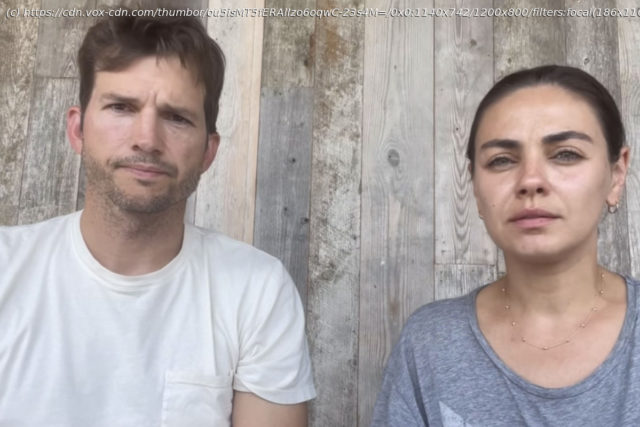Character letters can be an important part of criminal sentencing. The backlash against Ashton Kutcher and Mila Kunis, explained.
Ashton Kutcher and Mila Kunis want to clarify a few things.
Critics say the video, in which they stress their awareness of the “pain caused” by the letters, failed to atone for what Kutcher and Kunis wrote in their Masterson letters.
Chrissie Carnell Bixler, one of Masterson’s victims, denounced the letters in an Instagram Story, stating “in my opinion you’re [Kutcher] just as sick as your ‘mentor.’” Actress Christina Ricci seemed to reference Kutcher and Kunis’s character portraits in an Instagram Story, writing: “So sometimes people we have loved and admired do horrible things. They might not do these things to us and we only know who they were to us but that doesn’t mean they didn’t do the horrible things and to discredit the abused is a crime.”
Kunis and Kutcher’s tone-deaf letters have created a common refrain: Wouldn’t it be easier not to defend a rapist?
But that response misunderstands the purpose of character letters or letters of support for convicted people. Theoretically, these letters — which are commonplace in criminal cases — aren’t about a person’s innocence or last-ditch defense, but a plea for mercy and for the judge to see a fuller portrait of a person and their potential for rehabilitation. For those marginalized by society and facing a crushing criminal justice system, a character letter can act as a small and necessary check on the justice system.
I spoke with Colleen McCormack-Maitland, the deputy director of legal services at the Legal Action Center (LAC), about how these letters work. McCormack-Maitland and the LAC work to fight discrimination within the criminal justice system and advocate on behalf of those with arrest and conviction records, substance use disorders, and HIV or AIDS.
McCormack-Maitland highlighted how the pushback against Kutcher and Kunis’s testimonials (which she mentions are “counterproductive”) may be obscuring the actual intention and importance of these kinds of testimonials.
Colleen, explain character letters to me.
So my first job out of law school, I was a public defender for seven years. I’m really familiar with these types of letters, which I think at that time, I would have called them “a letter of support.” The point of these letters is to help the sentencing judge understand who the person is, beyond what they might have read in an indictment or heard in testimony at trial.
It’s important to understand that conviction and sentencing are two completely separate parts of the legal process. These letters come after conviction.
Right. At this point, Danny Masterson has been found guilty. He went to trial, a jury trial. In a jury trial, the judge doesn’t have a part in deciding someone’s guilt or innocence. After a person has been found guilty, [judges] decide the legal sentencing options. For each type of crime, there’s a set range and judges are allowed to consider what will be imposed within that range. Sometimes ranges can be huge.
The judge will, at this point, potentially have heard a lot of really terrible things about the person who was convicted of a crime. But they may never have heard anything from the person themselves because people aren’t required to testify in their own defense, and most people don’t.
And that’s where these letters come in, right? Like we’re jumping into the Masterson case with the judge determining how long Danny Masterson is going to be in prison. Ashton Kutcher and Mila Kunis said they were asked by the Masterson family to give the judge a personal account.






